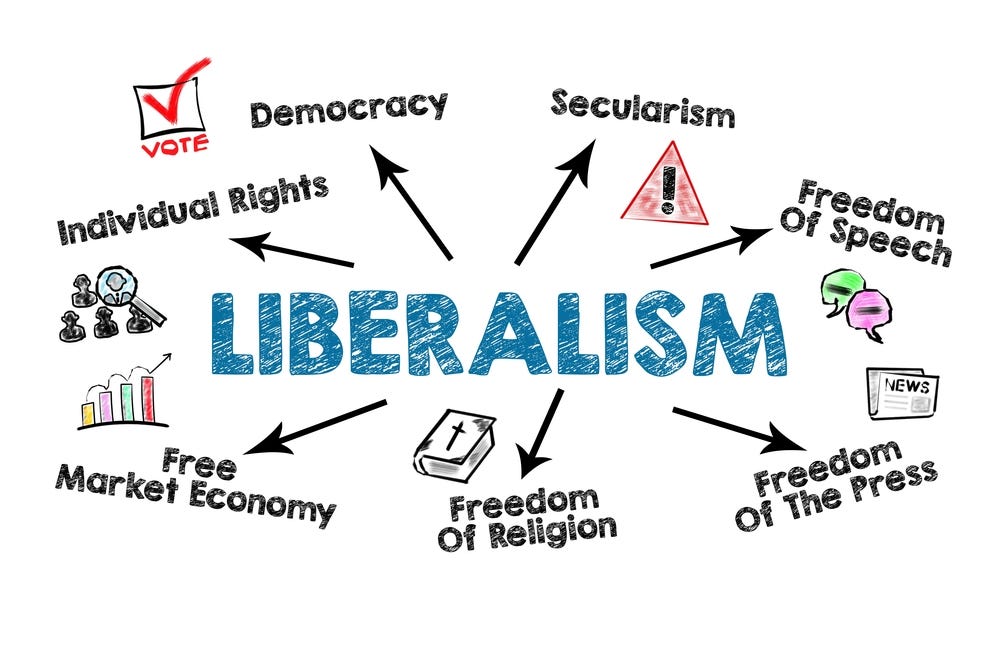E-Pluribus | August 15, 2023
Redefining death; conservatism in the big city; and what is post-liberalism, anyway?
A round-up of the latest and best writing and musings on the rise of illiberalism in the public discourse:
Christopher Tollefsen: What Happens When We Die?
Though the titular question sparks many spiritual and religious discussions, Christopher Tollefsen article at National Review concerns itself more with the medical, legal and ethical aspects surrounding dying and death. The American non-profit Uniform Law Commission is considering proposed changes to the Uniform Determination of Death Act that have ethical implications for organ donation and other end-of-life situations.
Two principles currently govern ethical organ removal for donation from patients at the end of life. The first is the dead-donor rule (DDR): Organs are not to be taken from a patient who is still living. Rigorous adherence to this rule prevents any appearance that a person is being killed for her organs.
The second is the Uniform Determination of Death Act (UDDA). Promulgated in 1980 by the Uniform Law Commission, it identifies the conditions under which a patient is to be determined to be dead: “An individual who has sustained either (1) irreversible cessation of circulatory and respiratory functions, or (2) irreversible cessation of all functions of the entire brain, including the brain stem, is dead. A determination of death must be made in accordance with accepted medical standards.”
Strictly speaking, neither the DDR nor the UDDA is law; the first is a widely held ethical norm that governs organ procurement; the second is a model law, intended, as the name implies, to shape uniform legal policy across all the states. And indeed, most states in the U.S. have adopted either the text of the UDDA directly or something very similar.
Now, the Uniform Law Commission is considering changes to the UDDA. The proposed modifications are controversial but are prompted by genuine difficulties with the intersection of the dead-donor rule and the Uniform Determination of Death Act as currently understood and practiced.
Read it all here.
John Ketcham: Dynamic Continuity
All the political talk of “red” and “blue” in recent years might give the impression that liberals take the cities and conservatives take rural areas, and never the twain shall meet. Writing at City Journal, however, John Ketcham insists there’s no reason conservatism cannot work in urban settings or anywhere else.
Conservatives since Burke have appreciated the uniqueness, complexity, and fragility of society. The immense coordination and cooperation necessary for any metropolis to thrive imply vulnerability to the consequences that result from any one thing going wrong. An outage on a single subway line, say, can disrupt life across the city. Combatting this law of urban entropy requires continuous effort, calling for a know-how that can quickly respond to challenges as they arise.
Tradition provides the default answers to such predicaments, and conservatives need no reminding of the value of received wisdom. Past solutions to similar and often recurring problems serve as guideposts for today’s decision-making. Of course, a conservative recognizes that yesterday’s answers cannot solve all of today’s problems. But far from stifling the adaptability needed to thrive in an ever-evolving city, a healthy deference to tradition fosters stability, allowing individuals and communities to feel secure enough to embrace gradual renewal without the fear of overwhelming disarray.
A desire to conserve can only take root, though, if the institutions and objects worth conserving are enduring enough to instill attachments and affections in the hearts of the citizenry. Walking the same streets as one’s urban (and sometimes biological) forebears, lined with many of the same buildings that those ancestors knew, turns everyday life into a Burkean enterprise in continuity. Local mediating institutions like churches and civic associations define the culture of each urban neighborhood, remaining relevant as newer generations take the place of older ones in a spirit of civic pride and stewardship.
Managing density’s challenges and consequences necessarily implies a more powerful and expansive government, something seemingly at odds with conservatism. But urban conservatives need not treat government as bad per se; government is bad only insofar as it encroaches upon the prerogatives of individuals and civil society. One man’s fun is his neighbor’s nuisance; leaving it to private individuals to resolve such disputes risks violence and disorder—so a robust police presence is needed. Without adequate public safety, individuals and communities fail to cooperate, leading to social and economic breakdown.
But strong urban communities can counteract the tendency for government growth by taking responsibility for resolving issues they believe are better solved locally. Indeed, George L. Kelling, one of the originators of Broken Windows policing, took pains in these pages to explain that to maintain order most effectively, police should learn from and adapt to communities and the private sector through continuous interaction.
Read it all.
Sohrab Ahmari (with Yascha Mounk) on Post-Liberalism
Classical liberalism’s obituary has been written and rewritten repeatedly, and there is certainly good reason to be concerned about its long-term health. Yascha Mounk of Persuasion recently hosted Compact magazine’s Sohrab Ahmari. Amari shares his prognosis for philosophical liberalism and what drives his thinking, while Mounk pushes back - liberally (as always, pun intended).
Ahmari: It's fair to characterize me as a post-liberal. It's a complicated term because it's sort of still pegged to liberalism in some way and doesn't have a positive content. But nevertheless, I think it's an apt term. I think that the biggest problem with philosophical liberalism is its refusal, quite consciously, to acknowledge the common good as something that is legible to all human beings. In other words, often liberals, classical or otherwise, when they hear the common good, they sort of imagine statist collectivism overriding the individual. But classically understood, common goods are goods that can be secured only by the community and that aren't diminished by virtue of being shared. That is, the more you share them, the more of those goods there are—justice, good order, etc. You don't get less justice if you divide up justice between people, and you can't individually secure justice.
I think philosophical liberalism, fundamentally, beginning whenever you want to date its rise, is a product of a world in which things seem much more in flux. Therefore, to speak of the common good appears as an imposition on the individual who should be free to maximize his or her individual autonomy as he or she sees it as long as there's no sort of harm done to the other or as long as the relationships are mediated by consent. So this ideology, I think it's a denial of the capacities of human reason (forget about Revelation), but it's a denial of the capacities of human reason of what we can reason about the good of the person. You could call it a classical critique of liberalism.
Mounk: One thing that puzzles me about what you were just saying is that when you read the founding documents of the American republic or of modern liberal democracy in other countries, some idea of the public or the common good is fundamental both to the rhetoric that was used to justify those institutions and to the design of US institutions. The Federalist Papers say that the point of representation is not just to mirror public opinion but to filter it in such a way as to derive superior insight. When you read Edmund Burke on the purpose of representation, it is precisely not for representatives to go and carry the interest of their constituencies to Parliament in London but rather for them to deliberate together in the pursuit of finding something that is actually in the larger good of a Commonwealth. I would argue that the basic institutions that we have today have been designed with an understanding of the public good. I would argue that what you're presenting as a critique of liberalism isn't a critique of liberalism at all—it's a description of some of the core insights of the founders of the liberal tradition. My stance is that you can absolutely think of some of the things you're arguing for in Tyranny, Inc. as part of a broader public good that is very recognizable to the Founding Fathers.
Where I start to get nervous is when that public good legislates a set of specific moral precepts. And my understanding is that your writing about what you call the “higher good” is starting to push against some of the other fundamental insights of a liberal tradition; namely, that there's a fact of fundamental pluralism in modern society, that you and I have fundamentally different conceptions about what our moral duty is, what we should do with our free time, how we should live our lives, and that part of the fundamental recognition of human equality is that there might not be a right answer to that. It’s perfectly compatible with liberalism that some members of our polity are going to be convinced that there is a right answer to that. And they may, in fact, be right; it may turn out that there is heaven and hell—we're not sitting in judgment of that. What we're sitting in judgment of is a policy in which some people arrogate to themselves the right to say, “I have the objectively right answer, and I'm going to impose that on you.” I might really think that, you know, your salvation is at stake. And I want you to be saved, and so I'm going to be making an argument for you with all passion and so on. But what I'm not allowed to do is to use the power of a coercive state in order to force you to do that.
Read the whole thing.
Around Twitter
The publisher and staff of the Marion County Record newspaper could be forgiven for thinking that maybe they’re not in Kansas anymore. The Foundation for Individual Rights & Expression and Freedom of the Press react to last week’s raid by local law enforcement:
David Brooks in The Atlantic on where the degradation of our public discourse comes from:
And finally, Conor Friedersdorf questions whether “Biden Country” is really that hard to find:










